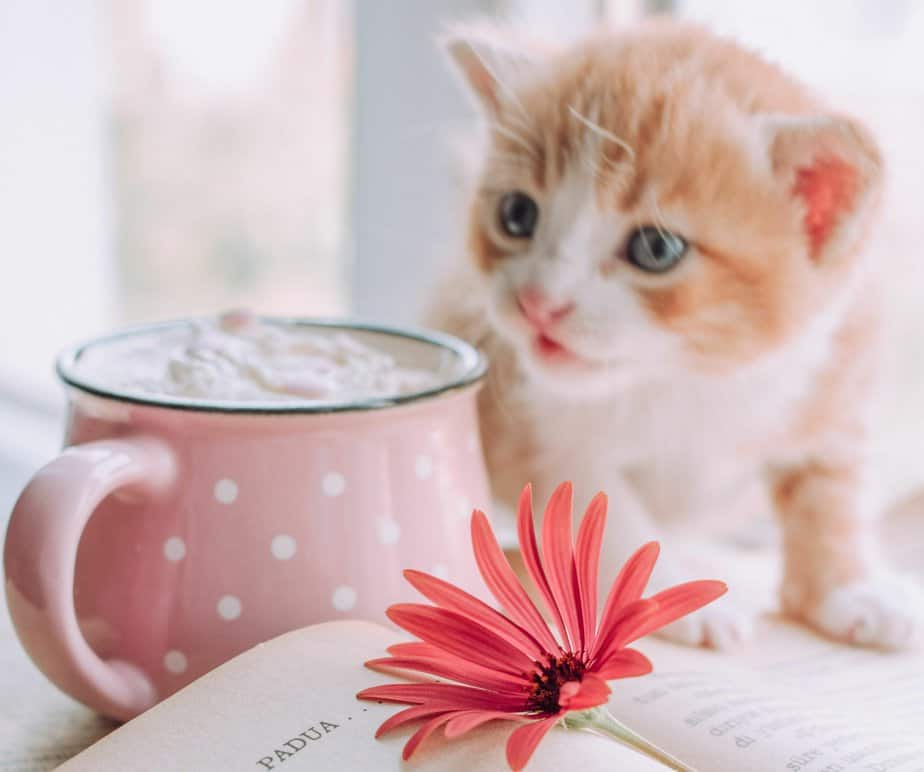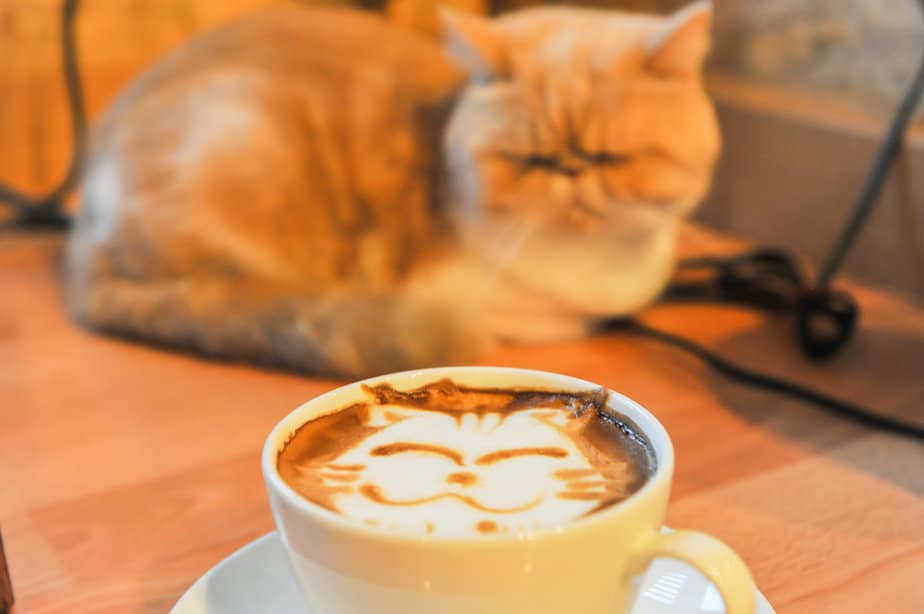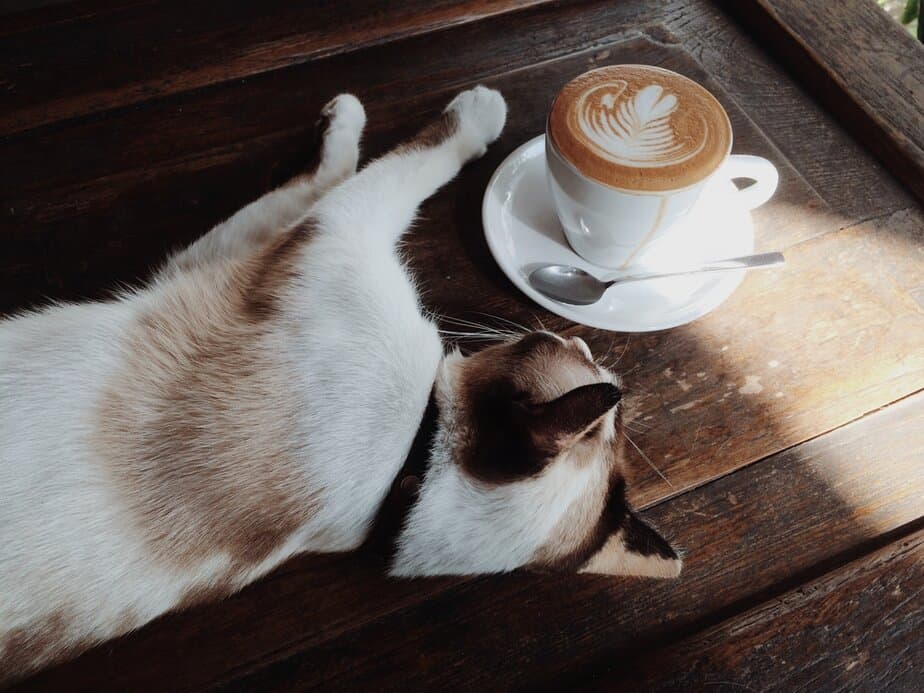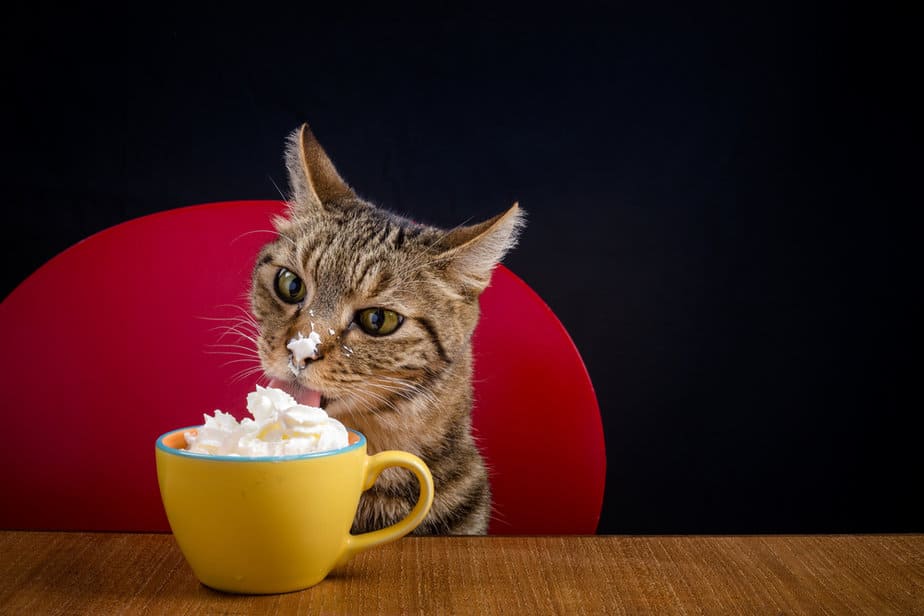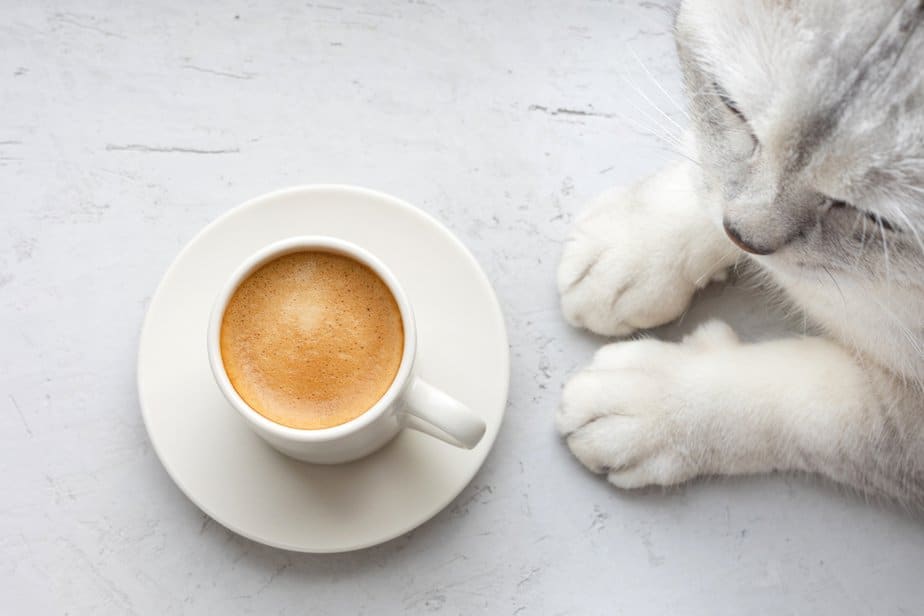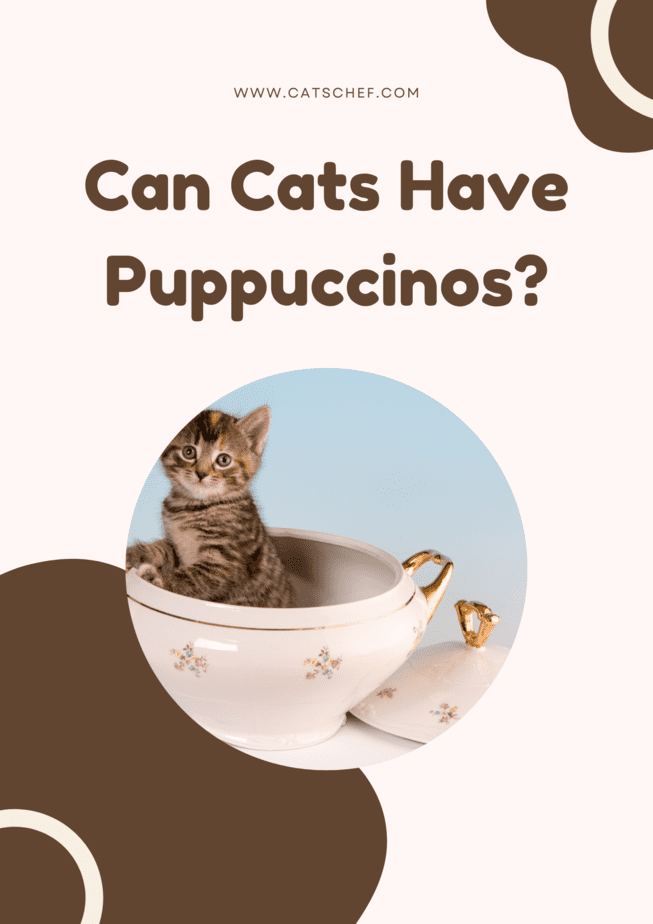📖 Table of Content:
Who knows every single Starbucks secret menu item better than the purr parent who doesn’t have enough time or energy? Cinderella Lattes and Rainbow Refreshers might not be able to help you get your purrbaby in line. But, what about a Puppuccino!? Can cats have Puppuccinos?!
So many influencers are snapping pics of their pups in the Starbucks drive-through. It’s no surprise your cat feels like she’s missing out on something. “Frodo gets to go on an adventure, ride shotgun, AND have a tasty treat from THE coffee chain everyone and their mother seems to obsess over!? How’s that fair!?”
You can only say no to her mooching meows so many times before you back down and raise the white flag. Or even better, raise your voice to ask the nice lady working at the Starbucks drive-through to give your precious purrincess her own Puppuccino.
According to our friends over at the ASPCA (American Society for the Prevention of Cruelty to Animals), cats can have Puppuccinos. But, that doesn’t mean that your cat should have them on a regular. Pup cups, or Puppuccinos, contain ingredients that might cause some gassiness and stomach discomfort.
So, you might want to consult with your vet and take a closer look at what you’re getting yourself into. What even is a Puppuccino? What’s a Puppuccino made with? And more importantly, can cats have Puppuccinos with no repercussions?
What’s a Puppuccino?
Don’t worry, you’re not the only purr parent looking up “can cats have Puppuccinos.” Maybe your purrbaby accidentally scoffed down someone’s pup cup or meowed your ears off until you agreed to let her have a taste. Either way, you’re not the only one with a lingering question mark over your head.
What’s a Puppuccino? How can something that’s clearly a play on the word cappuccino be even remotely safe for your kitten? Cappuccinos don’t come without the mandatory shot of espresso, a bit of milk, and a bit of foam. And these ingredients, while tasty, don’t sound like something your kitten should have.
Don’t worry, Starbucks isn’t trying to serve caffeine to your precious pet, whether it be a pup or a purr. Actually, the famous Starbucks espresso cup happens to be the only connection between caffeine and a Puppuccino.
When you order a Puppuccino you can expect to be presented with a simple cup of whipped cream FOR FREE. Sure, you might have to explain why you’re asking for a Puppuccino for your pet that’s definitely not a pup. But, most Starbucks baristas are more than happy to help.
Before you and your cat head over to the nearest Starbucks for a cup of Joe… You might want to give your veterinarian a quick call and check whether you should let her have a Puppuccino. It’s better to be safe than sorry, as most pet parents say.
What’s a Puppuccino made with?
Whipped cream, maybe?! Many pet parents wonder what makes Puppuccino a free treat for their pup. But, they soon remember that this tasty treat doesn’t contain anything other than whipped cream. Or, does it?!
Here’s the scoop, whipped cream contains a couple of ingredients that might make you rethink this whole “let me treat my purr to a pup cup and hope nobody stops me” thing. For example, whipped cream from Starbuck contains vanilla syrup which isn’t a typical whipped cream ingredient.
Let’s start from the beginning and see what we’re dealing with. Starbucks whipped cream (according to what we found online) contains cream, sugar, nitrous oxide, nitrogen, E471 emulsifiers, flavorings (vanilla syrup), and stabilizers (carrageenan).
And Starbucks vanilla syrup contains vanilla extract, citric acid, potassium sorbate (which is a preservative), sugar, and water. These unfamiliar words are making us second-guess our English language competencies. But, we can agree that they’re a lot more to unpack than a simple cup of whipped cream.
And before you start looking up potassium sorbate and carrageenan, these compounds are completely safe for your cat. On the other hand, we can’t say the same thing about heavy cream, sugar, and citric acid.
Grab your pen and paper and scroll down. Take some notes on why these Puppuccino ingredients might not be the best choice for your purrbaby.
So, can cats have Puppuccinos?
They can, kind of… Cats can have Puppuccinos from time to time, but they shouldn’t have them on a regular. Puppuccinos contain ingredients that can cause your cat gastrointestinal problems, digestive problems, and numerous other health problems.
Cats are carnivores which means they require meat, animal protein, and animal-sourced nutrients to lead a happy and healthy life. Their digestive systems are equipped with the enzymes necessary to break down and process meat. But, we can’t say the same thing about cream, sugar, and different additives.
Cats can’t have heavy cream
Here’s the thing, when kittens are born they feed off of their mother’s milk. They have no problem digesting the lactose from their mother’s milk. Their digestive system possesses the lactase enzyme that’s necessary to break down the lactose.
But, when kittens turn into cats they no longer need their mother’s milk. They start feeding off of meat (when they’re in the wild) and kibble (when they’re in the comfort of their own home). Their digestive systems lose the lactase and they become lactose intolerant.
So, what exactly does the heavy cream do to your cat’s digestive tract? Most cats can have a bite of cheese, a sip of milk, or a lick of Puppuccino without severe symptoms. But, when they have a bit more they risk experiencing stomach upset, diarrhea, and vomiting a couple of hours later.
And, when they continue having Puppuccinos over a longer period of time they risk developing numerous gastrointestinal diseases. “A little goes a long way”, especially when we’re talking about surprising your purrincess with a trip to her favorite coffee shop.
Cats can’t have sugar
Before we dive into the entire “cats can have Puppuccinos, but they can’t have sugar” thing, it’s important to emphasize that sugar isn’t toxic to cats. A little bit of sugar every now and then isn’t going to send your cat to the emergency animal center.
But, she also isn’t going to have a pleasurable experience going to the litter box after she scoffs down an entire Puppuccino on her own. Her digestive system doesn’t possess the enzymes necessary to break down and process sugar and other carbohydrates.
Carbohydrates aren’t a natural part of your cat’s diet, and that’s the main reason why she doesn’t possess those enzymes. That’s also the main reason why she can’t taste sweet things.
Apart from not having the enzymes necessary to break down sweet things, she also doesn’t have the sweetness receptors necessary to taste sweet things. She’s obsessed with Puppuccinos because of the fat and protein that’s contained within whipped cream, not because of the sugar.
So, what happens when your cat eats too much sugar? She might experience symptoms such as excessive thirst and urination, weight loss, increased appetite, vomiting, and diarrhea. She might also develop numerous gastrointestinal diseases such as extreme weight gain, obesity, and diabetes.
Cats can’t have citric acid
Cats can have Puppuccinos, but they can’t have artificial sweeteners, additives, and preservatives. These (typically hidden) ingredients can be detrimental to your cat’s health. Actually, some of them can even be fatal when consumed over a longer period of time.
Citric acid happens to be one of the Puppuccino ingredients that’s a major red flag. According to our friends over at the ASPCA, cats can’t have centric acid because they can experience severe symptoms of gastrointestinal upset and even nerve damage.
When your cat consumes something that contains citric acid (lemons, limes, oranges, and apparently Puppuccinos), make sure to take notice of any behavior changes. She might show signs of drooling, weakness, lethargy, and breathlessness.
These signs can easily turn into symptoms of gastrointestinal upset such as stomachache, diarrhea, and vomiting. They might even turn into irritations, redness, and rashes around her mouth. When you notice any of these symptoms contact your veterinarian and ask for advice.
Puppuccinos don’t contain enough citric acid to cause lasting damage to your cat’s health. But, it’s better to stay on the safe side and avoid Puppuccinos when you notice your cat’s experiencing gastrointestinal problems.
Cats can have Puppuccinos, but…
That doesn’t mean that they should! A once-in-a-while Puppuccino might put a smile on your cat’s face. But, who’s to say it won’t put a stomach bug in her digestive system, too?
Puppuccinos typically contain heavy cream, sugar, and additives which might not be the healthiest choice for your cat. She might experience a bunch of gastrointestinal and digestive problems ranging from diarrhea and vomiting to obesity and diabetes.
There are better treats available on the market. There aren’t many reasons (unrelated to getting a cute Instagram picture) why you would insist on letting your cat have a Puppuccino. While a couple of licks shouldn’t cause too much harm, it’s better to be safe than sorry.
